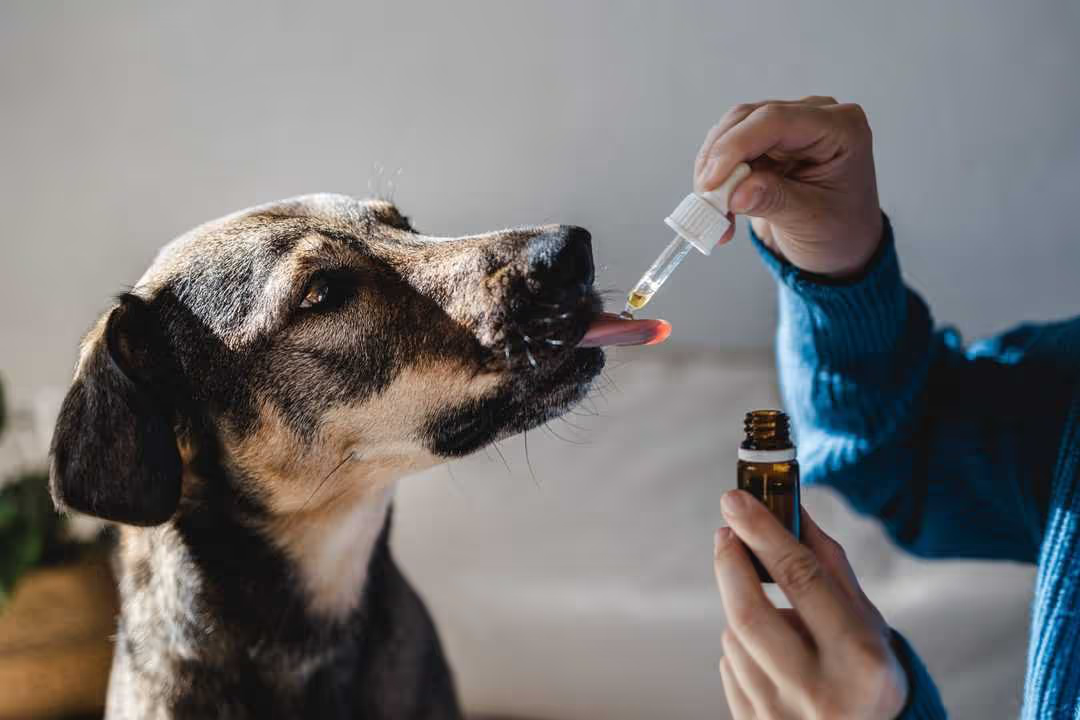For the Purrbabies


CBD has become popular with humans, but what about your pets? Here’s everything you need to know about using CBD oil for your dog.

The CBD industry has exploded in recent years, with many claiming that it can help remedy a variety of illnesses and diseases in people. But what about pets? Research has shown that cannabinoids interact with the endocannabinoid receptors (Trusted Source) located in the central and peripheral nervous systems. This helps maintain balance in the body and keep it in a healthy state. Let’s dive into more details about what CBD is and what to expect when giving it to your pet.
CBD, or cannabidiol, is a compound found in cannabis and hemp. It’s important to note that CBD does not contain delta-9-tetrahydrocannabinol (THC), the compound that gives marijuana its psychoactive properties.
It’s a popular supplement for humans and has been increasingly common for pets, too. CBD is known to help with pain, anxiety, and even symptom management during cancer treatments. But, there’s a lot more to know before deciding to give it to your pet.
Dog CBD products can come in many different forms, including capsules, oils, treats, and salves.
Like with any medicine or supplement, there’s the possibility of side effects when giving your pup CBD. Below are some of the most worrisome risks to be aware of:
The FDA hasn’t given official guidance or recommendations yet for CBD. While some states allow the usage, others have banned it completely. This lack of regulation leads CBD businesses and distributors to determine safety standards largely on their own.
So far there’s limited research about CBD’s effectiveness in humans—and even less about how it might affect pets.
CBD has strong effects on a variety of metabolic enzymes. This could potentially cause side effects, especially when combined with other drugs or medications.
The main side effects of CBD usage in dogs include nausea and fatigue. In humans, it can increase blood thinning and affect other medicines in your blood by competing for the liver enzymes that break them down.
Some research has pointed to the potential implications of CBD for a pet’s liver, suggesting it may cause elevated liver enzymes.
While CBD might be safe for pets, marijuana is not. Anything that contains THC is highly toxic to pets. Symptoms of marijuana poisoning include:
There’s a lot of anecdotal evidence to suggest that CBD can help dogs and cats, but there isn't a lot of safety or dosing data available.
Dr. Erica Irish
CBD use might come with health benefits for both people and pet owners. However, per the American Veterinary Medical Association (AVMA), (Trusted Source) few studies have evaluated the long-term clinical effects of CBD use in dogs. Some of the suspected benefits include the following:
According to our vet, Dr. Erica Irish, more information is needed. “There’s a lot of anecdotal evidence to suggest that CBD can help dogs and cats, but there isn’t a lot of safety or dosing data available.”
Currently, many vets can’t legally recommend CBD products for their patients. New research might be able to change this.
The FDA hasn’t approved the use of CBD in pets. If you decide to move forward with CBD products anyway, here’s what to look for:
These show the product in question has been tested by external (and therefore unbiased) companies. They see if the ingredient list is correct, including but not limited to the actual ingredients used and the percentage of each compound. Most products will offer a unique barcode that can provide you with the COA.
The NASC Seal of Quality Assurance ensures the product adheres to rigorous quality standards. If you’re going to give your pet CBD, look for an option with this seal.
CBD tends to work best in combination with terpenes, a naturally occurring substance in the cannabis plant.
You should always start slow and work up gradually. General recommendations are 0.1 to 0.2 milligrams for every kilogram your pup weighs. You can give your pup the resulting amount twice per day—but no more.
Always avoid CBD products for humans, which may contain xylitol and other ingredients that are highly toxic to dogs.
Look for organic options, which are more likely to be free of dangerous fungicides, pesticides, and more.
Hemp can legally contain up to 0.3% THC, so if your dog ingests a large amount of a CBD product, mild THC toxicity can occur.
While there’s a lot of anecdotal evidence to suggest it has some potential benefits, veterinarians are currently unable to legally recommend CBD products to their patients.
If your dog ingests too much CBD at one time, it’s possible to have a mild THC toxicity reaction. This can potentially lead to vomiting, lethargy, stumbling, and body tremors.
Yes, it’s been shown that CBD can help calm an anxious or stressed dog, just like in humans. That said, more research is needed to determine whether or not CBD is safe for dogs.








